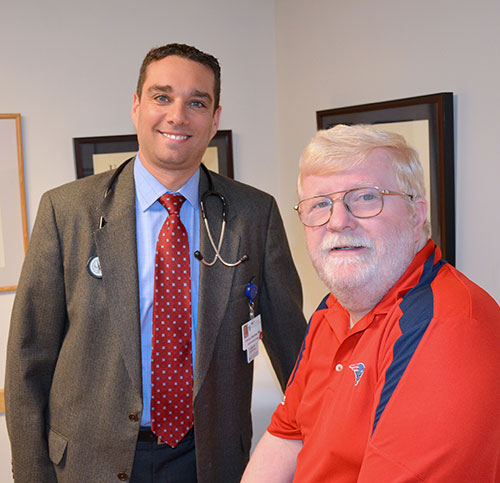Patient Stories
It was Christmas Eve when Salem resident Michael Cocozella received a call informing him that he had rectal cancer. On the other end of the phone was North Shore Medical Center (NSMC) gastroenterologist Joshua Namias, M.D., whom Cocozella had seen two days prior for a routine colonoscopy.

Many people know that the best way to prevent colon and rectal cancer is to get a colonoscopy beginning at the age of 50, or earlier based on your family history, and to continue with surveillance depending on the findings. A few months after his 50th birthday, Cocozella did just this and scheduled a colonoscopy at NSMC Salem Hospital.
After the colonoscopy, Dr. Namias informed Cocozella that he had observed and removed several polyps during the screening and referred him to NSMC colorectal surgeon Marc Rubin, M.D., for additional testing of the mass lesion he had also seen.
“I had my suspicions that something may be wrong when additional testing was required,” recalls Cocozella. “But even so, I was in total shock when they said it was rectal cancer. I had no family history of cancer, so I never thought it would happen to me.”
“It is important to realize that colon polyps typically have no symptoms,” says Dr. Namias. “Most people have no pain, bleeding or other evidence that would suggest a problem. Over time, however, these polyps can develop into cancer.”
Dr. Rubin shared Cocozella’s case with medical oncologist Joel Schwartz, M.D., and radiation oncologist Walter Sall, M.D., at the Mass General/North Shore Cancer Center in Danvers to discuss a treatment plan, which involved shrinking the tumor prior to surgery through radiation and chemotherapy.
“This was a serious diagnosis and I wanted a second opinion. I went downtown to a Boston hospital and was essentially presented with the same treatment plan,” states Cocozella. “The Mass General/North Shore Cancer Center offered great care, close to home. I could easily leave work for my radiation treatments and be back within an hour.”
After five weeks of treatment, his tumor had shrunk from the size of a walnut to the size of a dime and Dr. Rubin proceeded with surgery, successfully removing the entire tumor. After the procedure, Cocozella underwent eight rounds of chemotherapy to ensure that any remaining cancer cells were eliminated. This past fall he went in for his final CT scan and was given a clean bill of health. But that did not stop him from getting a routine colonoscopy in March, which he now has performed every three years due to his medical history.
“Michael is a perfect example of why it is so important to get screened,” says Dr. Namias. “He turned 50 and had a colonoscopy where his cancer, as well as several polyps, were identified. Because we caught it early enough, we were able to treat it in time and achieve a great outcome. Now, he is doing very well.”
Six years later, and still cancer free, Cocozella enjoys sharing his story with friends and the occasional stranger. He recalls the first time the opportunity came along during an ultrasound, not too long after being diagnosed. The nurse helping him was 51 and had yet to get a colonoscopy. “I nicely gave her a hard time about it,” he laughs. “I told her, ‘this is why I’m in here.’”

